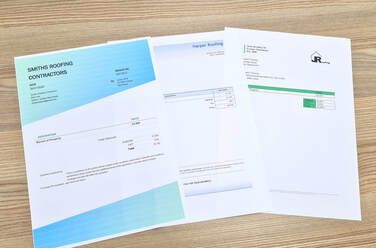

You may wish to start your search for a roofing contractor by asking your friends and family if they have used anybody recently that they would recommend.
Roofing contractors work alongside other tradesmen such as a builder, joiner or even an architect or local building inspector who may be able to recommend a suitable roofing contractor.
Not all companies have websites or social media platforms, but if they do, testimonials and images of past work will usually be available. However, be careful of stock images and false claims for credit of other companies’ work.
AMR’s vetting process includes obtaining references from past customers.

This is an important question when selecting a roofing contractor. Competence and experience in a particular discipline will offer reassurance about the quality of the work to be carried out.
Contractors should at least have public liability insurance which protects against any accidents which may occur during the works. Check that they have this and that it is in date.
Insurance-backed guarantees (IBGs) are commonplace nowadays and contractors who have this service incorporated into their systems of work are always preferable.
A contractor may be part of an association, which is often a good sign of their professionalism. It should be relatively easy to double-check this information, either online or by calling the association/federation directly and asking them if they can validate the claim.
However, it is also worth bearing in mind that some trade associations have low entry criteria, which does little to confirm the standards to which the contractor works. Check the trade association’s website to find their standards or entry requirements.
The Association of Master Roofers has a strict vetting policy for all its members which includes annual site inspections, annual office audits which check for public liability insurance, employer’s liability insurance, references from past customers, and health and safety compliance among other factors.
Through our strict vetting procedures, you can be satisfied that an AMR member has successfully passed a series of quality assurance factors in each of the specialised areas in which they are listed.
a) How many quotes do I need?
Quotes should be obtained from at least three contractors, ideally supplied on an official company-headed quotation letter.
Are these quotes offering the same services? You need to be able to compare them on a like-for-like basis.
b) Should I choose the cheapest quote?
Remember that expensive does not automatically mean high quality and cheap doesn’t automatically mean low quality. This is why a detailed quote is important.

If you are unsure of a contractor’s methods or materials, you should ask them to follow up the quotation with more details.
When asking for quotations, don’t be fooled by a cheap quote which turns out not to factor- in safety and risk management.
For example, if two contractors have quoted with scaffolding included, you should be very careful not to automatically accept a third cheaper quote where a company has decided to not include a scaffold, but will instead carry out repairs from a ladder.
Ladder repairs are acceptable, but the rule of thumb is that ladder work should only be acceptable when the works to be carried out are considered ‘short duration’, ie usually limited to 15 minutes of ladder time. Above that, and where works exceed two metres in height, a scaffolding or temporary working platform should be installed.
As a homeowner, you have a duty of care to ensure the roofer is carrying out work safely. It does not just fall to the roofer or roofing company to ensure overall safety to you, and the public.
We can all find construction work stressful when it is taking place on our properties and we want the disruption to be over as quickly as possible, but be aware that fast turnaround does not always equal good workmanship.
A re-roof can be a complex process and not something which should be rushed. This can often result in mistakes or details being left out. Be mindful of this when accepting quotes.
For example, one contractor who offers to complete the re-roof in one week, while another suggests the project may take a month, will potentially carry out the work to different standards.
Although the roofer should give an accurate price for the work to be undertaken, it is worth talking to the contractor about extras.
Extras are additional works which fall outside of the original quotation. These can be items such as timber repairs or making good parts of the roof or surrounding areas (chimneys, party walls, guttering, downpipes, etc), which on closer inspection require remedial works.
The contractor may not be able to ascertain these additional problems until a scaffold is erected. It is always sensible to allow a contingency budget for unforeseen remedial work. Most jobs will run smoothly without the need for any extras to be carried out, but it is wise to make an allowance for this when work commences.
Your contractor should always discuss extras with you, and both parties should pre-agree costs before any works outside of the original agreement are carried out.